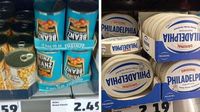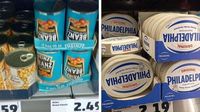In recent weeks, shoppers in Germany have noticed a peculiar trend in supermarkets: certain products, especially those from American brands, are being found upside down on the shelves. This is not merely a result of poor stocking; instead, it reflects a growing political movement known as 'Buy from EU,' which aims to encourage consumers to support European products over those from the United States.
The 'Buy from EU' movement, which has gained traction on platforms like Reddit with over 180,000 members, advocates for greater awareness of the origin of products and the importance of supporting local economies. According to Laura Catz, a marketing manager from Romania and the driving force behind the initiative, the goal is to draw attention to European companies without engaging in outright boycotts of American products. "We want to draw people's attention to European companies," Catz stated, emphasizing that the action is intended as a peaceful protest rather than a destructive measure.
The phenomenon reportedly began in Canada as a response to ongoing tariff threats from the USA and has since been adopted in various European countries, including Germany and France. Shoppers are flipping American-made products, from Heinz baked beans to Twix bars, upside down in stores, as a creative way to prompt discussions about the provenance of goods and their impact on local markets.
A Reddit post highlights this movement, showcasing images of upside-down products in a German supermarket. "The people in my city have understood the message," remarked a Reddit user upon posting a photo of the flipped Heinz bean cans. This shows the growing public engagement with the movement, where consumers are not just passively shopping but actively participating in a cultural dialogue about where their food comes from.
Despite the positive reception from some, the movement has sparked criticism from various angles. Some supermarket employees have voiced their frustrations, noting the additional workload that comes with restocking items back to their original positions. One Reddit user lamented, "It only means more work for the poor employees who have to restock everything,” highlighting the challenges faced by staff who must perform extra tasks due to customer-led initiatives.
Other critics question the efficacy of the movement, asking, "What can American companies do against the stupidity of their president?" This comment reflects a deeper skepticism about the connection between consumer choices and political actions, suggesting that some believe it is futile to blame brands for the decisions made at governmental levels.
The 'Buy from EU' movement has also gained increased visibility following recent discussions surrounding consumer responsibility. In late February, a researcher published a comprehensive list detailing American products and their European alternatives, which quickly garnered over 1.5 million views on social media. This list, ironically shared on X, the platform owned by Elon Musk, underscores the attention this topic has received and indicates a broader public interest in shifting consumer behaviors.
As the discussion continues, it becomes clear that the implications of this movement extend beyond simple product placement. It serves as a reflection of wider sentiments regarding international trade dynamics, consumer responsibility, and the intersection of commerce and politics. Supporters of the initiative maintain that every flipped product is not just an act of defiance against American brands but a call to strengthen European economies by making conscious purchasing decisions. The question remains whether such grassroots movements can enact real change or if they will simply be viewed as fleeting trends.
In conclusion, the upside-down products in German supermarkets symbolize a much deeper conversation about where we source our goods and the messages we send through our shopping habits. As European consumers navigate the complexities of global trade and national policies, movements like 'Buy from EU' serve as a focal point for advocating local over foreign, raising awareness about consumer choices in increasingly divided political landscapes.








